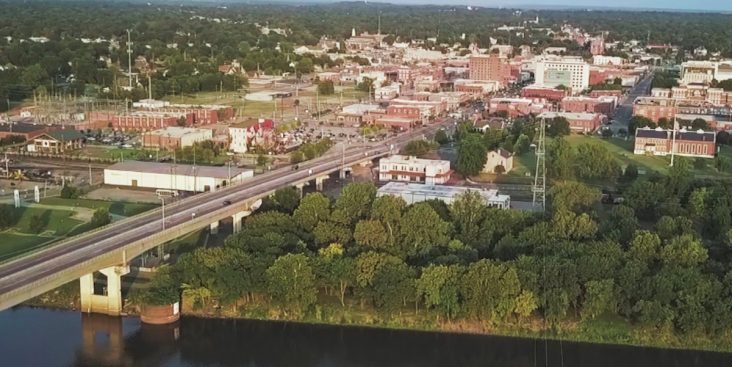Downtown Fort Smith assessment plan moves forward
by March 15, 2022 4:44 pm 1,922 views

The Fort Smith Central Business Improvement District (CBID) has garnered enough signatures to move forward with plans for a property assessment to fund operation, maintenance and repair and improvements within the district.
With signed petitions submitted at Tuesday’s (March 15) CBID board meeting, the board now has agreement from owners of 50.58% of the property value in the district. Board members agreed to continue collecting signatures with the goal of getting 60% before taking the assessment to the Fort Smith Board of Directors for approval.
“I think we work towards 60%, but move forward when we get 55% so we can get things to the board of directors sooner,” said Sam Sicard, board member and president and CEO of First National Bank of Fort Smith.
Deputy City Administrator Jeff Dingman said once the petition is submitted, the city clerk will verify the petition reached the required threshold of current property owners.
“I’ve started to make some notes on properties that I’ve ‘heard’ may have changed ownership in the last several months. I’ll do some more work on that but if you happen to know of specific properties changing ownership recently please let me know, especially in the case where the former owner signed a petition but the new owner has not,” Dingman said in an email to CBID board members, noting that if property has changed ownership since a signature was gathered, the new property owner would have to sign the petition.
The CBID board has worked toward a property assessment – primarily in downtown Fort Smith – for more than two years. The board voted in August 2019 to pursue an assessment on downtown business. The Fort Smith CBID is the only one in the state not funded by an assessment.
Before an assessment can be levied, property owners who own more than 50% of the property value in the district must sign a petition agreeing to an assessment. There are 479 individual properties in the district, some of which are owned by the same entity. The board started collecting signatures on the petition in June 2021.
The petition sets the assessment as not exceeding 10 mils. In April, the CBID board voted for a cap of 10 mils on the possible property assessment and to cap any property owner at a maximum $10,000 on assessment. There are about four properties in the assessment area that cap will affect, Dingman said. Commissioners have stated they will decide each year what the coming year’s assessment will be if the assessment passes. The first year’s assessment, which if approved will be 2022, will be 8 mils. The CBID approved a resolution in November for a 6 mil assessment on property in the district. In April, commissioners voted to make the initial assessment 8 mil instead of 6 mil in order to reach the $300,000 they hoped to collect annually.
The CBID plans to use assessment funds to support an ambassador program that would hire off-duty police officers as part of a Safety and Security program for downtown. That program would cost about $136,000 annually, according to a proposed operating budget. The assessment would also fund a Green and Clean project that would include streetscape maintenance and landscaping, which could incorporate care of flowerbeds as well as pruning and possible replacement of trees, cleaning and repairs to benches, lighting and trash receptacles, litter control, conversion of lights along Garrison Avenue to LED and more. The CBID would need about $300,000 to fund both programs, Dingman said.
Based on property values in 2019, each 1-mil assessment on properties within the CBID would amount to $38,834.47 in annual operating revenue. However, that estimate did not take into account any property owned by not for profit agencies or local, state or federal government. Of the land parcels in the CBID, 115 are tax-exempt and have no value assigned to them. These include properties owned by governments, non-profits, churches, etc., according to information provided by the CBID.
In 2019, the CBID hired Total Assessment Solutions (TAS), Sebastian County’s contracted third-party appraisal partner, to assess those properties. Looking at the total appraised property, each 1-mil assessment on all properties within the CBID would amount to approximately $61,000. However, some of those properties would be exempt from the assessment. While some government properties would continue to be exempt from the assessment, not for profit entities would not be, said Michelle Allgood, the attorney working with the CBID on the assessment question.
Hanna said last year that commissioners had agreed that city properties would not be assessed, but county and state properties would be. Until late last year, Baptist Health-Fort Smith had held out on signing the petition.
“They had looked at it originally and the non–profit status was dictating how they reacted. They had made a nice offer to make a contribution,” said Bill Hanna, CBID board chair and president and CEO of Hanna Oil & Gas.
When Hanna went back to Baptist about signing the petition, they had agreed. That agreement turned the tide in collecting signatures, Dingman said. Baptist Health owns about 28% of the property in terms of value in the district, Dingman said.
Board members said they had gotten verbal confirmation from more business owners that they would sign the petitions. Those signatures just still need to be collected.
Once the signatures are gathered, the CBID board of directors will present that petition and the plan to the Fort Smith City Board of Directors. Dingman said under the state law if the CBID has the required signatures on the petition, the city’s BOD would be compelled to approve the assessment as an ordinance.
